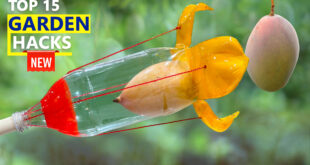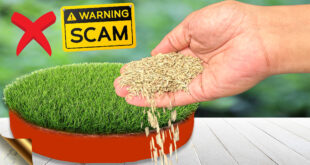Today we will look into the best recipe for an All-Purpose Mixed Pure Organic Fertlizer Powder you can prepare yourself at home and store it and use on your plants for best results. I will also recommend you a similar 100% organic pesticide recipe at the end of this episode. Going completely organic has been my new year resolution for this year 2019.
Well, Last year, we prepared a Mixed fertilizer containing both chemical and organic fertilizers with a detailed discussion and calculations on how to calculate the total NPK value. For beginners and those interested in these scientific calculations, please check out that article.
Now, we will quickly start the recipe for this well balanced organic mixed fertilizer, you can use for any plant in varying dosage to produce healthy growth, increase flowering and fruiting. We will also total the NPK value of by adding the NPK values of each of these components. For beginners – NPK means Nitrogen, Phosphorous and Potassium which are the Major nutrients required for plant growth.
- COW DUNG: Whatever animal
manure you are using, whether horse dung or cow dung or even goat dung. Note
down its NPK value. Here we are using decomposed
cow dung. So NPK is 3-2-1.
We are taking 2000 grams of cowdung powder.
- COMPOST (
Whether home made compost or VERMICOMPOST): In this recipe, we are adding
vermicompost which also contains many useful trace elements, so no need to add
that micronutrient powder containing trace elements. The NPK of vermicompost is
1.78, 0.77,0.94
We are taking 2000 grams of Vermicompost.
- BONE MEAL POWDER, you can also use any of the other meals like sterameal, fishmeal or bloodmeal. If you are a pure vegetarian, you can use soya bean meals as a substitute for bone meal. So the NPK for bonemeal is 3.5, 18, 0
Here, will add both bone steamed meal
powder as well as coarse bone meal chips powder mixed. This fine powder is just
to make it quicker for release of nutrients.
We are taking 1000 grams of Bone meal powder.
- we shall also add some optional stuff into this for additional fortification which also act as soil pesticides or pest repelling agents, particularly neem cake powder or Karanj powder. Then we will also add Mustard cake powder. We will discuss the benefits of each of these some other time.
Well, the first one Neem Cake Powder: NPK of neem powder is here:
N(Nitrogen 2.0% to 5.0%), P(Phosphorus 0.5% to 1.0%), K(Potassium 1.0% to 2.0%).
N – 2.0% to 5.0%, P – 0.5% to 1.0%, K – 1.0% to 2.0%
We are taking 1000 grams of Neem cake powder +
1000 gms Karanj Powder +
- of Mustard cake powder.
- Optionally, You can add 500 gms of Epsom Salt + 500 Grams of Micronutrient Powder to include those trace elements or micronutrients like Mn, zinc, Fe, boron and many others to safeguard our plants from any deficiencies. Also you can add more ingredients you wish to like used tea powder and any other stuff, because this is a one time mix and you offer this on a periodic basis and only once in 15 days or so and you add almost all organic nutrients and this reduces burden and saves you a lot of time, plus this become a quality mix!.
Nothing to worry about over dosage which is an issue with chemical fertilizers which can cause chemical burns. This is pure organic fertilizer with hardly any adverse effect on over dosage.
After Approximate Calculation, the Total NPK value of this fertilizer mix is:
22, 25,07
Have a look at this equation in the table:
| Ingredient | N | P | K |
| Cow Dung (3-2-1)-2000g | 6 | 4 | 2 |
| Vermicompost -2000g | 3.5 | 1.5 | 2 |
| Bone Meal -1000g | 3.5 | 18 | 0 |
| Neem, Mustard etc | 9 | 1.5 | 3 |
| TOTAL | 22 | 25 | 7 |
Then optionally you can perform a soil PH test and mix either woodash or lime to make your soil more alkaline if its too acidic and if your soil is too alkaline, you can add alum powder into this mix.
And one more important point from storage point of view: you might feel some moisture in this mixture due to some moist ingredients like vermicompost. You can either use completely dry ingredients before mixing or you can dry this mixture in sunlight and then store in air tight containers. It will not loose its NPK value much on drying. Remember to mix the ingredients thoroughly well for best results.
RECOMMEDED DOSE PER PLANT? Depending on the plant, you can use one tablespoon once every 15 days, specially for flowering plants and once in a month for other plants. Make sure you apply this after tilling or raking the top soil and apply around the plant – not directly on roots.
Check out the Best Pure Organic Pesticide Recipe.
 GKVKs – Gardening Tips and Store Gardening Tips and Store
GKVKs – Gardening Tips and Store Gardening Tips and Store



